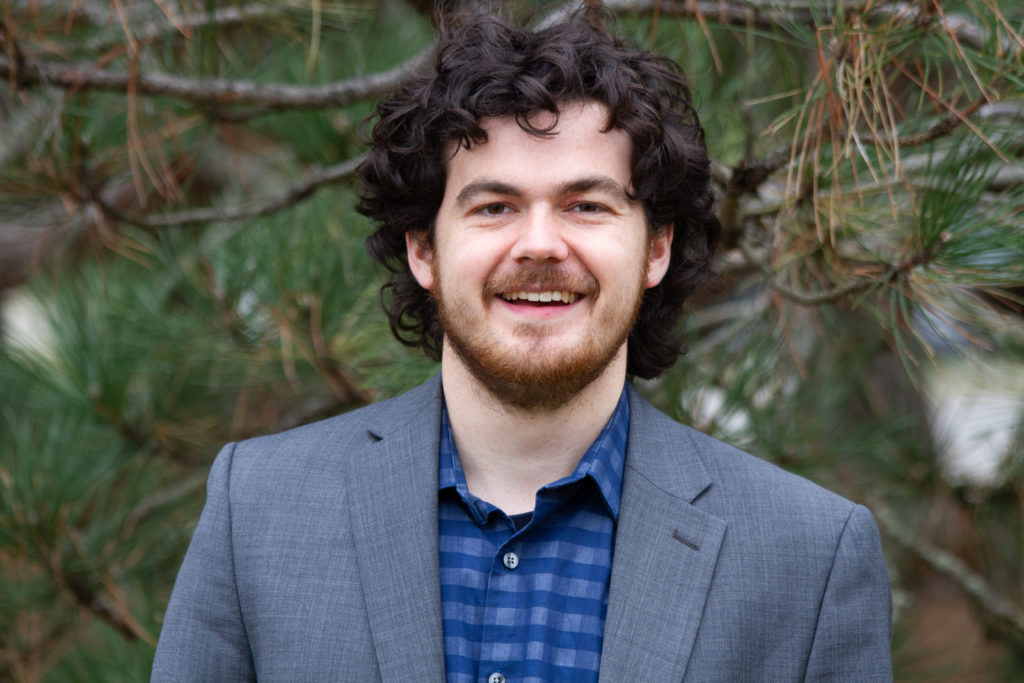
Zachary Jerome Receives CUTC Outstanding Student of the Year Award for 2023
Jerome Received Award on January 8 in Washington, D.C.

Jerome Received Award on January 8 in Washington, D.C.
By Calvin Tuttle
Every year, each USDOT-funded University Transportation Center (UTC) selects a Student of the Year which is awarded at the Council of University Transportation Centers (CUTC) banquet in January. Selected students receive flight and hotel accommodations in D.C., as well as a registration to the Transportation Research Board’s annual meeting. This year, the Center for Connected and Automated Transportation has nominated Zachary Jerome, a Ph.D. candidate under Henry Liu, Ph.D.

Zachary joined the program at the Civil and Environmental Engineering Department at the University of Michigan-Ann Arbor in 2020 after receiving his Bachelor’s Degree from the University of Tennessee, Knoxville in Civil Engineering at Viola Performance. He serves as a graduate student research assistant at the Michigan Traffic Lab (MTL), supervised by Professor Henry Liu, and is the current President of the Michigan Transportation Student Organization (MiTSO). He is the author of several publications including “Trajectory Data Processing and Mobility Performance Evaluation for Urban Traffic Networks“, “Predicting Lane-by-Lane Flows and Speeds for Freeway Segments“, and “Determining Yellow Change and Clearance Intervals for Left-Turning Phases: Evaluation of the Current Guidelines with Connected Vehicle Data“. Zachary met with CCAT Communications Specialist, Calvin Tuttle, to discuss his research and nomination.
Calvin: Can you tell us about your research here at the University of Michigan?
Zachary: My research focuses on using connected vehicle (CV) and infrastructure technology to improve traffic control systems in terms of efficiency and safety. I am particularly interested in how we can make better management and investment decisions with our current traffic operation infrastructure. Specific work includes implementing new signal timing plans based on safety and mobility performance measures from telemetry data and exploring their advantages over current methods. I would like to expand these concepts to a new traffic management and control framework where CVs contribute to cooperative planning, signal management, road space management, and safety prioritization.
Calvin: Where did you grow up?
Zachary: I grew up in Knoxville, TN from age 10 through high school. Before that I was born in Michigan and lived in Ohio for a couple years.
Calvin: Do you have any hobbies outside of transportation research?
Zachary: I am a big fan of Michigan athletics and follow professional Detroit teams. I also enjoy spending time with my church community, running, and traveling with my girlfriend. As a classically trained violist, I also love going to concerts and listening to music.
Calvin: Is there a single moment that lead you on the path to transportation engineering?
Zachary: There was not a single moment, I have always been interested in transportation. However, a summer study abroad trip to China in undergrad opened my eyes to the potential of transportation advancements and that was the first time I seriously considered pursuing a Ph.D.
Calvin: What role are currently playing in CCAT research?
Zachary I work on the next generation of traffic control and operations as a member of the Michigan Traffic Lab led by Dr. Henry Liu. Currently I focus on using connected vehicle data to inform traffic signal optimization decisions.
Calvin: What activities are you currently participating in that advance CCAT’s efforts in education, outreach, training, and workforce development?
Zachary: I serve as the president of the Michigan Transportation Student Organization (MiTSO), which explores different professional, academic, research, and mentorship opportunities in transportation engineering and planning at the university and in industry. As president, I lead the planning of MiTSO’s vision and organize different speaker events, tours, and our participation in competitions. We work to broaden the transportation related experience for students at the university.
Calvin: What accomplishment from the past year are you most proud of?
Zachary: I was honored to be elected by my peers to serve as the MiTSO president. Their support gave me a huge confidence boost.
Calvin: What plans do you have after finishing your Ph.D.?
Zachary: I want to work at the intersection of research and industry by facilitating the implementation of state-of-the-art research. I would like to fast-track the realization of new technologies, programs, software, and ideas developed by researchers.
Calvin: Do you have any advice for students that are entering the program and working with University Transportation Centers (UTC) such as CCAT?
Zachary: Don’t discount your own intuition and ideas. You were brought to the program because someone believed in your potential to contribute.